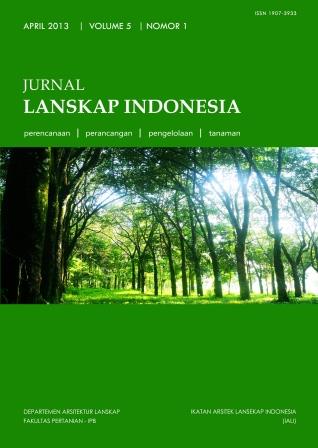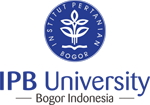PERENCANAAN LANSKAP WISATA PANTAI TANJUNG BARU BERBASIS ECO-LANDFORM
Abstract
ABSTRACTBeach landform is geographically formed by sand and located in sea shore. Land use change of mangrove forest into embankment and the development of tourism in Tan-jung Baru Beach has lead to the occurrence of enviromental degradation in this area. This research was aimed to identify and analyze bio-physical condition, and also to propose landscape planning concept and development toward the ecologycal landform based tourism planning. The method used in this research refers to ecological approach with the planning stages by Gold (1980). That method consists of preparation, inven-tory, analysis, synthesis, and landscape planning. Descriptive and spatial analyze were used to determine the quality ecology and tourism aspects. Spatial analysis of these aspects is use to determine the quality of ecology and tourism area of Tanjung Baru Beach. The result of this research shows that there are 4 quality categories of ecology aspect which are worst, less, rare, and good. The tourism aspect found that the category is the same as in ecology aspect. The proposed recommendation is focused on conservation and rehabilition of mangrove forest as ecological based tourism planning.
Keywords: Ecology, Landform, Beach, Tourism, Landscape Planning
Downloads
This journal permits and encourages authors to post items submitted to the journal on personal websites or institutional repositories both prior to and after publication, while providing bibliographic details that credit, if applicable, its publication in this journal. However, after the article is submitted and published in this journal, it is fully copyrighted by the Jurnal Lanskap Indonesia or JLI. If excerpts from other copyrighted works are included, the author must obtain written permission from the copyright owner and give credit to the source in the article. Then, the writer or reader is allowed to copy, share, and redistribute articles/material in any form. But it must still include the appropriate source and credit because the article in this journal is licensed by Creative Commons Attribution 4.0 International License (CC BY 4.0).
I. Proposed Policy for Journals That Offer Open Access
Authors who publish with this journal agree to the following terms:
- Authors retain copyright and grant the journal right of first publication with the work simultaneously licensed under a Creative Commons Attribution License that allows others to share the work with an acknowledgement of the work's authorship and initial publication in this journal.
- Authors are able to enter into separate, additional contractual arrangements for the non-exclusive distribution of the journal's published version of the work (e.g., post it to an institutional repository or publish it in a book), with an acknowledgement of its initial publication in this journal.
- Authors are permitted and encouraged to post their work online (e.g., in institutional repositories or on their website) prior to and during the submission process, as it can lead to productive exchanges, as well as earlier and greater citation of published work (See The Effect of Open Access).
II. Proposed Policy for Journals That Offer Delayed Open Access
Authors who publish with this journal agree to the following terms:
- Authors retain copyright and grant the journal right of first publication, with the work after publication simultaneously licensed under a Creative Commons Attribution License that allows others to share the work with an acknowledgement of the work's authorship and initial publication in this journal.
- Authors are able to enter into separate, additional contractual arrangements for the non-exclusive distribution of the journal's published version of the work (e.g., post it to an institutional repository or publish it in a book), with an acknowledgement of its initial publication in this journal.
- Authors are permitted and encouraged to post their work online (e.g., in institutional repositories or on their website) prior to and during the submission process, as it can lead to productive exchanges, as well as earlier and greater citation of published work (See The Effect of Open Access).



























